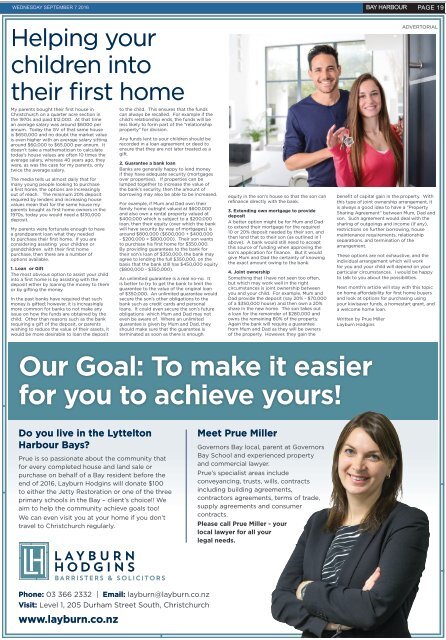Create successful ePaper yourself
Turn your PDF publications into a flip-book with our unique Google optimized e-Paper software.
Wednesday <strong>September</strong> 7 <strong>2016</strong><br />
BAY HARBOUR<br />
PAGE 19<br />
Helping your<br />
children into<br />
their first home<br />
ADVERTORIAL<br />
My parents bought their first house in<br />
Christchurch on a quarter acre section in<br />
the 1970s and paid $12,000. At that time<br />
an average salary was around $6000 per<br />
annum. Today the GV of that same house<br />
is $650,000 and no doubt the market value<br />
is even higher with an average salary sitting<br />
around $60,000 to $65,000 per annum. It<br />
doesn’t take a mathematician to calculate<br />
today’s house values are often 10 times the<br />
average salary, whereas 40 years ago, they<br />
were, as was the case for my parents, only<br />
twice the average salary.<br />
The media tells us almost daily that for<br />
many young people looking to purchase<br />
a first home, the options are increasingly<br />
out of reach. The minimum 20% deposit<br />
required by lenders and increasing house<br />
values mean that for the same house my<br />
parents bought as first home owners in the<br />
1970s, today you would need a $130,000<br />
deposit.<br />
My parents were fortunate enough to have<br />
a grandparent loan what they needed<br />
to purchase their first home. If you are<br />
considering assisting your children or<br />
grandchildren with their first home<br />
purchase, then there are a number of<br />
options available.<br />
1. Loan or Gift<br />
The most obvious option to assist your child<br />
into a first home is by assisting with the<br />
deposit either by loaning the money to them<br />
or by gifting the money.<br />
In the past banks have required that such<br />
money is gifted; however, it is increasingly<br />
more common for banks to not make any<br />
issue on how the funds are obtained by the<br />
child. Other than reasons such as the bank<br />
requiring a gift of the deposit, or parents<br />
wishing to reduce the value of their assets, it<br />
would be more desirable to loan the deposit<br />
to the child. This ensures that the funds<br />
can always be recalled. For example if the<br />
child’s relationship ends, the funds will be<br />
less likely to form part of the “relationship<br />
property” for division.<br />
Any funds lent to your children should be<br />
recorded in a loan agreement or deed to<br />
ensure that they are not later treated as a<br />
gift.<br />
2. Guarantee a bank loan<br />
Banks are generally happy to lend money<br />
if they have adequate security (mortgages<br />
over properties). If properties can be<br />
lumped together to increase the value of<br />
the bank’s security, then the amount of<br />
borrowing may also be able to be increased.<br />
For example, if Mum and Dad own their<br />
family home outright valued at $600,000<br />
and also own a rental property valued at<br />
$400,000 which is subject to a $200,000<br />
loan, then their equity (over which the bank<br />
will have security by way of mortgages) is<br />
around $800,000 ($600,000 + $400,000<br />
- $200,000 = $800,000). Their son wants<br />
to purchase his first home for $350,000.<br />
By providing guarantees to the bank for<br />
their son’s loan of $350,000, the bank may<br />
agree to lending the full $350,000, on the<br />
basis that the bank still has $450,000 equity<br />
($800,000 - $350,000).<br />
An unlimited guarantee is a real no-no. It<br />
is better to try to get the bank to limit the<br />
guarantee to the value of the original loan<br />
of $350,000. An unlimited guarantee would<br />
secure the son’s other obligations to the<br />
bank such as credit cards and personal<br />
loans. It could even secure the son’s future<br />
obligations which Mum and Dad may not<br />
even be aware of. Where an unlimited<br />
guarantee is given by Mum and Dad, they<br />
should make sure that the guarantee is<br />
terminated as soon as there is enough<br />
equity in the son’s house so that the son can<br />
refinance directly with the bank.<br />
3. Extending own mortgage to provide<br />
deposit<br />
A better option might be for Mum and Dad<br />
to extend their mortgage for the required<br />
10 or 20% deposit needed by their son, and<br />
then lend that to their son (as outlined in 1<br />
above). A bank would still need to accept<br />
this source of funding when approving the<br />
son’s application for finance. But it would<br />
give Mum and Dad the certainty of knowing<br />
the exact amount owing to the bank.<br />
4. Joint ownership<br />
Something that I have not seen too often,<br />
but which may work well in the right<br />
circumstances is joint ownership between<br />
you and your child. For example, Mum and<br />
Dad provide the deposit (say 20% - $70,000<br />
of a $350,000 house) and then own a 20%<br />
share in the new home. The son takes out<br />
a loan for the remainder of $280,000 and<br />
owns the remaining 80% of the property.<br />
Again the bank will require a guarantee<br />
from Mum and Dad as they will be owners<br />
of the property. However, they gain the<br />
benefit of capital gain in the property. With<br />
this type of joint ownership arrangement, it<br />
is always a good idea to have a “Property<br />
Sharing Agreement” between Mum, Dad and<br />
son. Such agreement would deal with the<br />
sharing of outgoings and income (if any),<br />
restrictions on further borrowing, house<br />
maintenance requirements, relationship<br />
separations, and termination of the<br />
arrangement.<br />
These options are not exhaustive, and the<br />
individual arrangement which will work<br />
for you and your child will depend on your<br />
particular circumstances. I would be happy<br />
to talk to you about the possibilities.<br />
Next month’s article will stay with this topic<br />
on home affordability for first home buyers<br />
and look at options for purchasing using<br />
your kiwisaver funds, a homestart grant, and<br />
a welcome home loan.<br />
Written by Prue Miller<br />
Layburn Hodgins<br />
Our Goal: To make it easier<br />
for you to achieve yours!<br />
Do you live in the Lyttelton<br />
<strong>Harbour</strong> <strong>Bay</strong>s?<br />
Prue is so passionate about the community that<br />
for every completed house and land sale or<br />
purchase on behalf of a <strong>Bay</strong> resident before the<br />
end of <strong>2016</strong>, Layburn Hodgins will donate $100<br />
to either the Jetty Restoration or one of the three<br />
primary schools in the <strong>Bay</strong> – client’s choice!! We<br />
aim to help the community achieve goals too!<br />
We can even visit you at your home if you don’t<br />
travel to Christchurch regularly.<br />
Meet Prue Miller<br />
Governors <strong>Bay</strong> local, parent at Governors<br />
<strong>Bay</strong> School and experienced property<br />
and commercial lawyer.<br />
Prue’s specialist areas include<br />
conveyancing, trusts, wills, contracts<br />
including building agreements,<br />
contractors agreements, terms of trade,<br />
supply agreements and consumer<br />
contracts.<br />
Please call Prue Miller - your<br />
local lawyer for all your<br />
legal needs.<br />
Phone: 03 366 2332 | Email: layburn@layburn.co.nz<br />
Visit: Level 1, 205 Durham Street South, Christchurch<br />
www.layburn.co.nz


















